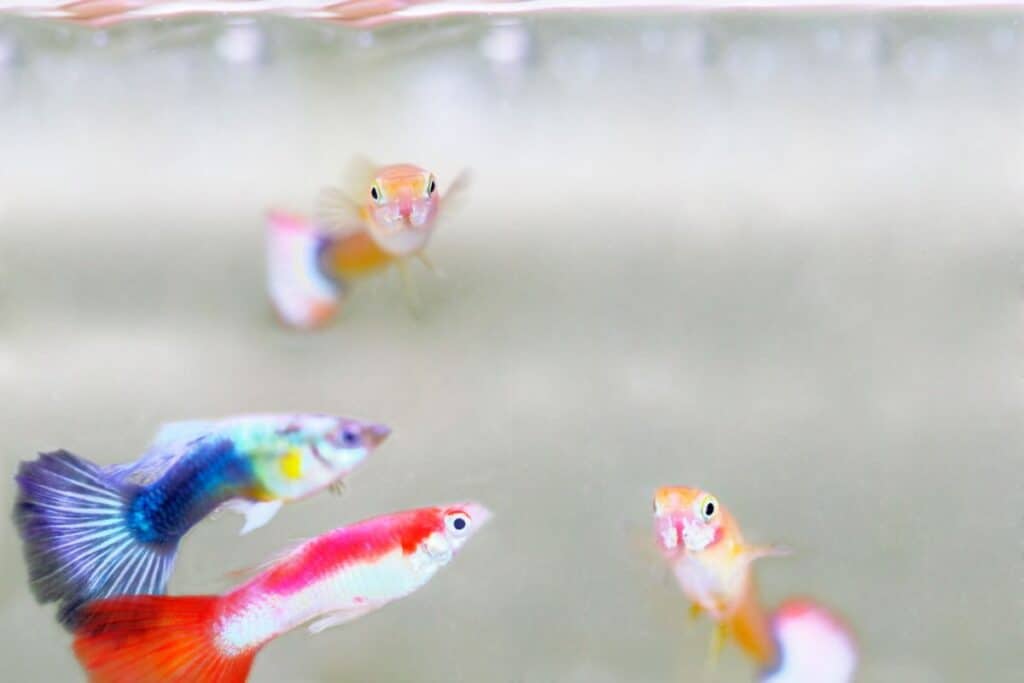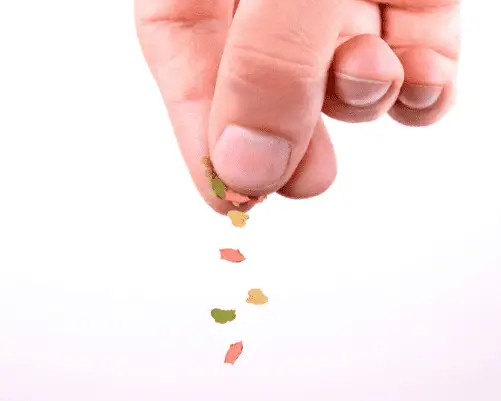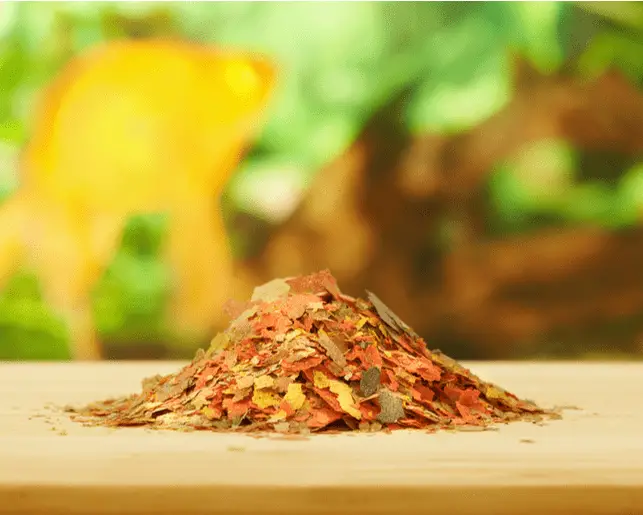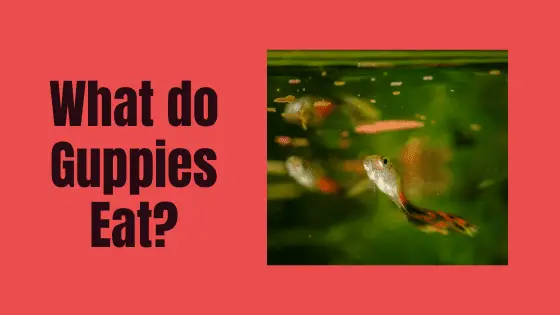Guppies are widely well known as easy first fish, as their brilliant colors, darting movements, and hardy natures make them highly rewarding and easy to care for. One of the significant advantages of keeping guppies is their range of diet, which makes them easy to feed.
This article is going to discuss what is best to feed your guppies.
Guppies are naturally omnivorous fish whose wild diet includes plant and animal matter. When feeding your guppies, try to ensure they enjoy the broadest diet possible and mimic what they would eat naturally. Avoid processed or sugary foods, which can negatively affect your fish.
Guppies flourish on a wide range of diets; however, some are likely to keep these fish brighter and healthier than others. Read on to discover what these iridescent little fish eat in the wild, the best foods for you to incorporate into your guppies’ diets, and some foods to avoid feeding them.

What Do Guppies Eat In Their Natural Environments?
In their natural environment, guppies are omnivores and feed on a variety of foods, including small insects, crustaceans, algae, and plant matter. They are also known to feed on plankton and other small organisms found in the water.
Guppies have small, upturned mouths that are well-suited for picking small bits of food from the water’s surface. They also have teeth in their jaws and on the roof of their mouths, which allow them to grind up small pieces of food.
In the wild, guppies are often found in streams, rivers, and ponds that have a lot of plant life. They will feed on algae and other plant matter found in these areas. They are also known to feed on small insects and crustaceans that live in and around these bodies of water.
While their diets can vary based on what is regionally available, all guppies seem to thrive on a varied diet containing both plants and animal fragments. This means they require the nutritional components of both to be at their healthiest.
What Should You Feed Your Guppies?
In captivity, the guppies’ naturally omnivorous diet means they will happily eat a wide range of foods, including commercial fish food, dried and frozen food, and live foods.
However, just because guppies will eat just about anything doesn’t mean that everything is equally suitable for them! The nutrition they receive will impact their health and even their pigmentation! Part of our responsibility as fish owners is thus to ensure that our pets eat a balanced diet.
To ensure that your guppies are eating a balanced diet, try to imitate their natural diet and the nutrients they naturally receive. Vary their food to include plant and meat-based components in addition to dry food. Including the following types of food into your guppies’ diet will ensure it is nutritionally balanced.
Feeding Your Guppies Live Food
I feed my guppies frozen bloodworms as an occasional treat. You can get them in little frozen blocks (ice cube size) from most pet stores.. These are rich in protein and essential fats and oils, which will nourish your guppies’ health, but for this reason, they should only be given once or twice a week.
I tend to let it thaw out for 20 minutes before adding it to the tank so it has softened up a bit. If there is anything left after 15 minutes, I then remove it from the tank with a little net so it doesn’t start to mess my water parameters up.
You can also buy food like baby brine shrimp in frozen or dried forms. While the dried variety is less fun for the fish, it may be more convenient for you and contains the same nutritional value as the frozen variety.
Feeding Your Guppies Plant Matter
Plant matter is an essential part of the diet of most wild guppies, with algae specifically being a staple. Plant and algae matter provides your fish with many nutrients they could not get elsewhere.
Because these nutrients are uniquely vital, fish in captivity must have plenty of vegetable matter in their diets. You should ensure that your fish tank contains ample algal matter for your adult guppies and guppy fry to feed on.
Frozen plant or vegetable matter (including household vegetables like peas, finely chopped cucumber, or shredded lettuce) should also be incorporated into your guppies’ diets. Like the live food, this should be a periodic snack (once every 2-7 days) rather than an everyday meal.
Feeding Your Guppies Dry Food
Dry food, especially flakes, is often recommended to guppies, and many people feed their fish solely on flakes. Flakes make for a good base food; however, we do not recommend relying on them too heavily. Your fish will be much healthier if you supplement flakes with more nutritious food like that discussed.
When buying fish flakes, opt for higher quality food containing both vegetable matter and protein, as this will contribute to a balanced diet. Never buy fish pellets for your guppies, as these are intended for larger fish, and they won’t be able to open their mouths widely enough to eat them!

What Food Is Unsuitable For Guppies?
Equally important to knowing what to feed your guppies is knowing what not to feed them! Guppies will eat just about anything with great enthusiasm, so the fact that they’re eating something does not mean it’s good for them!
Human Food To Avoid Giving To Guppies
While vegetables fit just as easily in your guppies’ diets as in your own, the same cannot be said for all human food! Some of the food in your kitchen is potentially very harmful to your fish.
Avoid feeding your guppies bread and oily foods, as these dirty their water quickly while providing virtually no nutritional value to your fish’s diets. Oily food has the disadvantage of creating a film over the surface, which prevents oxygen exchange and may thus kill fish or plants in the tank.
Stay away from all highly processed foods (such as lunch meats or sausage), as these generally contain high numbers of preservatives, which may be poisonous and even lethal to your fish.
Lastly, while your guppies thrive on vegetables, fruit may be harmful to them. In the wild, guppies are exposed to virtually no fruit, meaning that they have a very low sugar tolerance. If you are considering feeding fruit to your guppies, be careful that it is only a minimal amount very occasionally.
Live Food To Avoid Feeding Guppies
Avoid feeding your fish tubifex worms. While pet stores sometimes recommend these as good live food options, they are potentially very dangerous to your fish. This is because they may contain a specific bacterium that may be lethal when passed on to your fish.
Another food source to avoid is daphnia. These are only harmful in large quantities when they may deplete oxygen levels in the water. However, this, combined with the fact that they are among the most expensive and challenging of all live food, means that they are generally considered not worthwhile.

Conclusion
Getting your guppies’ diet right is essential, as this significantly contributes to their health, agility, and brilliant colors. The best diet for guppies mimics their eating habits in a natural environment and thus provides them with the range of nutrients they need to grow and flourish.
This means a diet containing a combination of plant and animal-based products. We recommend supplementing dried foods with both live food and algae or vegetables. Stick to these guidelines, and avoid feeding your fish highly processed, oily, or sugary foods or tubifex worms to watch them thrive!

